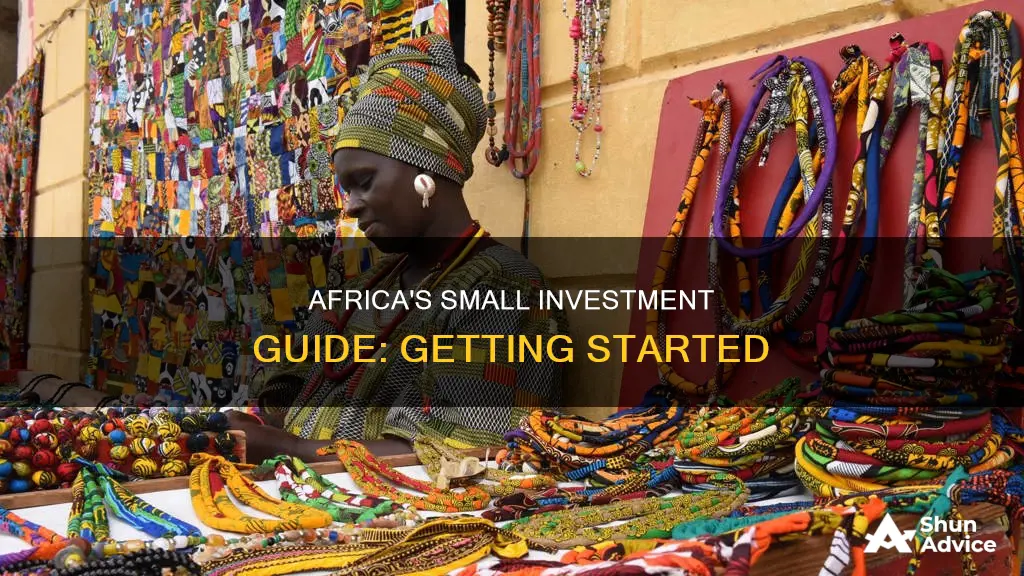
Africa is rapidly becoming one of the most sought-after destinations for investors, especially those looking for emerging markets. The continent has witnessed significant economic development since 2000, with many countries transforming their economies into attractive prospects. Africa boasts extensive natural resources, a young and increasingly educated workforce, greater stability in governance, and enhanced prospects for economic growth.
For new investors looking to make small investments in Africa, mutual funds or exchange-traded funds (ETFs) are often recommended as they offer diversification and professional management. These funds track a large basket of companies operating in the region, reducing the risk associated with relying on a single stock or venture. Examples include the VanEck Africa Index ETF, iShares MSCI South Africa Index Fund, and VanEck Egypt Index ETF.
Additionally, micro-investing platforms like Stash and Easy Equities offer low or no minimum deposit requirements, making it easier for individuals with limited capital to start investing in various assets, including stocks, ETFs, and cryptocurrencies.
While investing in Africa presents opportunities, it is important to approach it with caution due to the continent's political instability, civil unrest, and governance-related challenges. Nevertheless, with the right guidance and research, investors can identify lucrative opportunities in various sectors, including finance, healthcare, information and communication technology (ICT), agriculture, and real estate.
| Characteristics | Values |
|---|---|
| Investment opportunities | Financial services, healthcare infrastructure, healthcare services, personal healthcare products, Information Communications Technology (ICT), telecommunications, energy, water and sanitation, transportation, accommodations, agriculture, aerospace and defense, consumer goods, design and construction, environmental technology, food and beverage, and textiles and apparel |
| Population | 1.4 billion, estimated to make up one-fifth of the world's population by 2030 |
| Natural resources | Oil, natural gas, hydroelectric power, gold, platinum, uranium, cobalt, diamonds, arable land |
| Economy | Fastest-growing economies in the world, with extensive natural resources, a young and educated workforce, stable governance, and prospects for economic growth |
| Investment risks | Political instability, civil war, corruption, bureaucracy, inadequate policies, civil unrest, regional conflicts |
| Investment vehicles | Mutual funds, exchange-traded funds (ETFs), American depositary receipts (ADRs), real estate investment trusts (REITs) |
| Country-specific opportunities | Egypt, Morocco, South Africa, Rwanda, Botswana, Ghana, Mauritius, Côte d'Ivoire, Kenya, Tanzania |
What You'll Learn

Tax-free investing in South Africa
Africa is rapidly becoming one of the most sought-after destinations for emerging market investors. The continent boasts extensive natural resources, a young and increasingly educated workforce, and greater stability in governance. For investors looking to make small investments in Africa, mutual funds or exchange-traded funds (ETFs) are the most sensible options. These funds offer diversification, professional management, and ease of trading on U.S. exchanges.
Now, if we focus on South Africa, tax-free investment accounts (TFIAs) and tax-free savings accounts (TFSAs) are great options for South Africans to save and invest without paying taxes on the returns. These accounts offer tax benefits on interest, dividends, and capital gains, encouraging long-term savings and investments. The annual limit for these accounts is R36,000, with a lifetime limit of R500,000. It is important to note that these limits are set by the South African Revenue Service (SARS) and are subject to change over time.
TFIAs and TFSAs have different structures and uses. TFIAs include a range of investment products like unit trusts, ETFs, and retail savings bonds, catering to those seeking higher returns through diversified investments. On the other hand, TFSAs are typically simpler savings products offered by banks, such as savings accounts or fixed deposit accounts. While TFIAs offer the potential for higher returns, they also carry more risk compared to the simpler and more predictable nature of TFSAs.
When considering tax-free investment accounts in South Africa, it is essential to remember that they are most beneficial over the long term. The longer your investment grows, the more substantial the returns will be, and none of it will be taxed. Additionally, it is worth noting that these accounts cannot be used as transactional accounts, and withdrawals will count against your limits.
Some of the best tax-free investment accounts in South Africa include EasyEquities, Allan Gray, Ninety One, Fedgroup, Satrix, Coronation, Alex Forbes, Sygnia, and Old Mutual. These providers offer a range of investment options catering to different risk appetites and investment goals.
A Guide to Investing in European Equities
You may want to see also

Micro-investing in South Africa
Micro-investing is a great way for people to profit from the higher returns offered by financial markets without the stress of traditional investing. It is a low-commitment, convenient, and simple way to enter the share market, especially for those with little savings or income. By removing the barriers to investing, such as brokerage account fees, micro-investing platforms encourage people to invest even with limited funds.
Micro-investing platforms are often app-based and leverage exchange-traded funds (ETFs). These apps offer personalised portfolios based on an individual's risk tolerance, which is calculated using a series of questions about age, life plans, and aversion to loss. Some apps facilitate one-time or recurring deposits by linking directly to your bank account, while others invest your spare change by syncing with your debit or credit card and investing the difference between the purchase price and the next full rand amount.
Micro-investing is a gateway to the share market for individuals with limited savings or income. It is ideal for those who are new to investing, lack experience, or are sceptical about investing. It is a simple way to start setting aside small amounts of money regularly with minimal commitment.
In South Africa, tax-free investment means you don't pay tax on your investment returns, and the taxes you save are reinvested to grow your savings further. This type of investment is ideal if you earn a taxable income. You can access tax-free savings products, including cash deposits and ETFs, through most banks, investment companies, and stockbrokers. However, it is essential to note that there are contribution limits for tax-free investments in South Africa.
While micro-investing provides a convenient and low-stress way to invest, it is still subject to the inherent risks of the financial markets. These risks include market volatility, liquidity issues, and the potential for loss. As with any investment, it is crucial to understand these risks and make informed decisions based on your financial goals and risk tolerance.
For those looking to invest in Africa, there are other options besides micro-investing. Mutual funds and exchange-traded funds (ETFs) are often recommended for new investors, offering diversification and professional management. More experienced investors might consider American depositary receipts (ADRs) as a way to participate in specific companies. Additionally, real estate investment trusts (REITs) provide a simple way to invest in African real estate, an asset class that has been overlooked by investors in the past but may offer potential for rapid growth.
A Guide to Investing in Vanguard from India
You may want to see also

African stock markets (ETFs and mutual funds)
Africa is rapidly becoming one of the newest destinations for emerging markets investors. The continent boasts extensive natural resources, a young and increasingly educated workforce, and greater stability in governance. For new investors looking to make small investments in Africa, mutual funds or exchange-traded funds (ETFs) are recommended. These funds offer diversification, professional management, and ease of trading on U.S. exchanges. Here are some key points about investing in African stock markets through ETFs and mutual funds:
Exchange-Traded Funds (ETFs)
ETFs provide a straightforward way to invest in a broad range of African stocks. They are traded on U.S. exchanges and offer built-in advantages such as diversification and professional management. Here are some prominent ETFs to consider:
- VanEck Africa Index ETF (AFK): This ETF tracks some of the largest and most liquid stocks in Africa, with a focus on South Africa, Morocco, and Canada. It has held about 82 stocks and has experienced average losses in net asset value over the past five years.
- IShares MSCI South Africa Index Fund (EZA): This fund is allocated primarily to mid-sized and large companies in South Africa's financial, materials, and consumer discretionary sectors. It has delivered negative average monthly returns over the past five years.
- VanEck Egypt Index ETF (EGPT): The VanEck Egypt Index ETF provides access to Egypt, the third-largest economy in Africa, with an allocation of around 93%. It posted annualized average losses over the five years ending in June 2022.
Mutual Funds
Mutual funds are another option for investing in African stock markets. They invest in a diverse range of securities, often targeting specific economic sectors or regions. Here are some notable examples:
- T. Rowe Price Africa and Middle East Fund (TRAMX): TRAMX focuses on banks and companies in Africa and the Middle East, with over 25% of its portfolio in South Africa. It experienced average quarterly growth of 4.41% on an annualized basis over a five-year period.
- Commonwealth Africa Fund (CAFRX): Launched in 2011, CAFRX is one of five mutual funds under the Commonwealth International Series Trust. It invests primarily in equity and debt securities issued by African companies in manufacturing and mining. It experienced average quarterly losses of 3.02% over a five-year period.
It's important to note that investing in African stock markets carries higher risks than more developed regions. Due diligence and a thorough understanding of the African markets are crucial before making any investment decisions.
Certificate of Deposit: A Smart Investment Option in India
You may want to see also

African real estate properties
The African real estate market offers a wide range of investment opportunities, from residential properties to commercial spaces and retail areas. The continent's rapid urbanisation, economic growth, and demographic trends make it an attractive prospect for investors seeking to diversify their portfolios and capitalise on the potential for substantial returns.
Residential Properties
The emergence of a growing middle class in Africa, aspiring to own homes, has led to a noticeable interest in residential properties. This demand is met by leading real estate entities introducing modern residential units and unique office areas. The scale of projects varies, catering to individuals and large-scale entities with projects ranging from €3000 to €20 million.
Commercial Spaces and Office Areas
The rise in urban living and the presence of global corporations in Africa have led to a growing need for office structures and business areas. Leading cities in Africa are evolving into centres for business, technological advancements, and innovation. This sector offers not just infrastructure but also spaces that cultivate inventiveness and expansion.
Commercial Units and Retail Areas
The rise of the middle class in Africa has resulted in an evident increase in the popularity of malls and entertainment centres. Real estate entities are playing a pivotal role in altering the visual appeal of cities and curating new experiences. From Nigeria to Algeria, Mauritius, and even Costa Rica, there are numerous investment opportunities in commercial areas.
Hospitality Real Estate
Africa's steady increase in its tourism sector, attracting both domestic and foreign visitors, presents another investment opportunity. By purchasing lodging in well-known tourist locations, investors can profit from this trend.
Factors to Consider
When considering investing in African real estate, it is important to assess the risks and benefits. Political stability, infrastructure development, urbanization, and economic growth are key factors influencing the market. Understanding the complexities of investing in Africa's diverse political, social, and economic environments is crucial before entering the market.
Mitigating Risks
To reduce the risks associated with African real estate investments, it is advisable to partner with property developers who have a proven track record of delivering successful investment properties in Africa. Collaborating with local developers, property managers, and stakeholders with intimate knowledge of the market can provide valuable insights and access to exclusive opportunities.
Building a Diversified Investment Portfolio: Strategies for Success
You may want to see also

African natural resources
Africa is incredibly rich in natural resources, with large untapped reserves of natural gas, oil, and hydroelectric power. The continent boasts vast gold, platinum, uranium, cobalt, and diamond reserves, as well as an abundance of arable land. According to the UN, Africa holds 30% of the world's mineral reserves, 12% of the world's oil, and 8% of the world's natural gas reserves. The continent also contains over 80% of the world's chromium and platinum reserves and around 40% of its gold reserves.
Africa's natural resources sector is increasingly attracting strategic investments, particularly in the mining and energy sectors. This is due to several factors, including rebounding commodity prices after pandemic-related restrictions, sanctions on Russia, a major metals producer, and the need for developed nations to secure raw materials.
The continent's substantial mineral resources make it a significant producer of minerals such as cobalt, chromium, manganese, tantalum, diamonds, and uranium. Cobalt, an essential component of electric vehicle batteries, is produced predominantly in the Democratic Republic of the Congo (DRC), which accounts for about 67% of global production and holds nearly half of the world's cobalt reserves. Tantalum, used in electronic equipment, is also produced in significant quantities in the DRC and Rwanda, which together produce nearly half of the world's supply.
Africa's natural resources present a significant opportunity for the development of the mining industry, which is currently underdeveloped. The continent's wealth of natural resources, combined with its growing demand for goods and services, make it an attractive prospect for investors.
However, investing in African assets is generally considered risky due to political instability and corruption in some countries. Additionally, the long gestation period of developing mines can be a deterrent for investors. Nevertheless, with improved governance and business environments, many countries in Africa are becoming more stable and attractive investment destinations.
To mitigate investment risks, it is essential to conduct thorough due diligence and carefully consider the opportunities and challenges presented by each African country.
Stable Investment Portfolios: Strategies for Long-Term Success
You may want to see also
Frequently asked questions
Africa is rapidly becoming one of the top destinations for emerging markets investors. The continent has extensive natural resources, a young and increasingly educated workforce, and more stability in governance. According to the World Economic Forum, over 40% of Africans will belong to the middle or upper classes by 2030, leading to a higher demand for goods and services.
The main risk of investing in Africa is political instability. Corruption, bureaucracy, and inadequate policies can cause headaches for investors. International investors should also be wary of civil unrest and regional conflicts, which can impact the economy and lead to regime changes.
There are various investment opportunities in Africa, including:
- African stock markets (ETFs and mutual funds)
- African real estate properties
- Natural resources, particularly crude oil reserves and mining industries
- Startups, fintech firms, and local SMEs
- Tax-free investing in countries like South Africa







